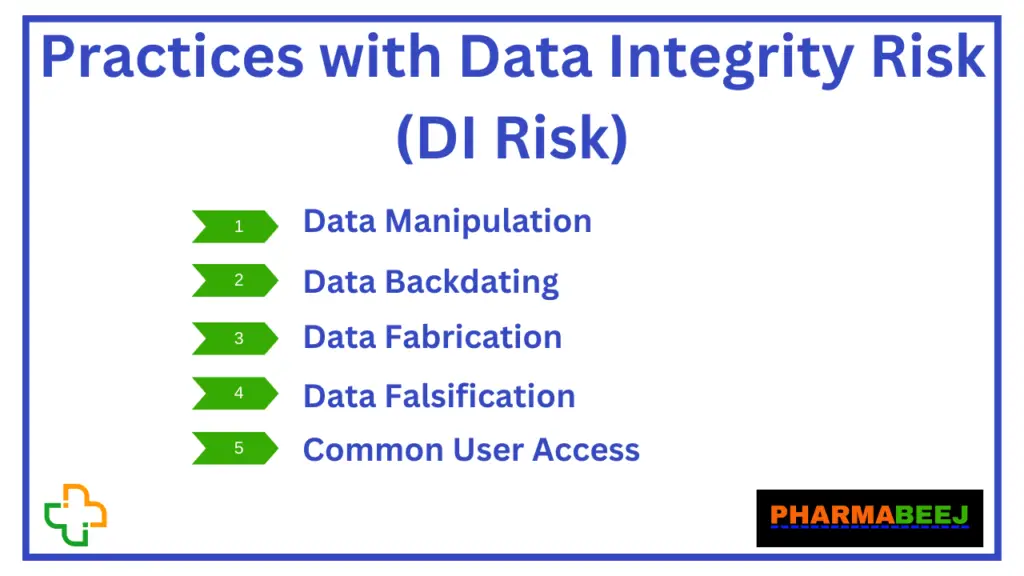What are the practices with data integrity risk?
Data integrity (DI) issues and data integrity risks related to those issues are very serious problems for any organization.
There are many practices that are being followed in the pharmaceutical industry also. Here are presented some practices with data integrity risk.
Data Integrity Issue 1 :
Data recording in personnel notes, loose sheets of paper or sticky notes, followed by transcription in original documents.
DI Risk related to Issue:
- Allows manipulation of data as GxP records can be written after events.
- No evidence of original data recording in a GxP document, and no traceability.
- Chances of potential transcription error.
Data Integrity Issue 2 :
Raw data is discarded after transcription in records, or no data to support the records.
DI Risk related to Issue:
No evidence of the authenticity of the recorded value.
Data Integrity Issue 3 :
Backdating of records, signing records at a later time with past date and time.
DI Risk related to Issue:
- Questions of authenticity of all records & data.
- Indicates a lack of oversight and control.
Data Integrity Issue 4 :
Reporting results without performing the task. or Employees who signed were not available on premises at the time of activity completed.
DI Risk related to Issue:
- Intentional fraud and fabrication of data.
- Questions of all the results by individuals, groups or organizations.
Data Integrity Issue 5 :
Activity not recorded contemporaneously.
DI Risk related to Issue:
- Potential data loss/error
- Difficult to rely on data generated
Data Integrity Issue 6 :
Destruction of records and data without justification and without proper recording of destruction activity.
DI Risk related to Issue:
- Indicating selecting recording only (Good data only recorded)
- The data set is no longer complete
- Provides opportunities to ignore failing results
Data Integrity Issue 7 :
Re-running the sample to obtain better results. (Trial injection, repeat analysis without suitable justification, not all results reported)
DI Risk related to Issue:
- Testing into compliance
- Borderline results passed due to method variability, selective data reported
- Potentially failing samples in “trial injection” was replaced by passing batch, indicating a lack of confidence in the method and product quality.
Data Integrity Issue 8 :
Data falsification (change in integration parameters of chromatographic data to obtain passing results.
DI Risk related to Issue:
- Indicated falsification of data
- intentional fraud
Data Integrity Issue 9 :
Common user access login for computerized systems
DI Risk related to Issue:
- No traceability of operation execution and data deletion
- Access control and user rights can not be implemented
- No control over who can do what
Data Integrity Issue 10 :
Sharing password
DI Risk related to Issue:
- No traceability of operation execution of the actual user
- Bypasses the access control and user right system
- Potential for deletion of the non-satisfactory data.
Data Integrity Issue 11 :
Audit trail disable or not fully enabled.
Data Integrity Risks related to the Issue:
- Doesn’t provide a complete record of activity
- Allows data manipulation and data deletion without any justification, selective data can be deleted
- Allows potential backdating by changing system date and time
These are some DI issues and data integrity risks associated with that issues.

Also read:
- Practices to avoid data integrity issues
- Laboratory investigation of aberrant results part-3
- What is APQR?
- What is the difference between OOS, OOT, OOE and OOC?
- Disintegration test calibration
- Karl Fischer Titration Interview Question and Answer
- Interview Question and answer for Quality control
Refer YT Channel: Pharmabeejpro